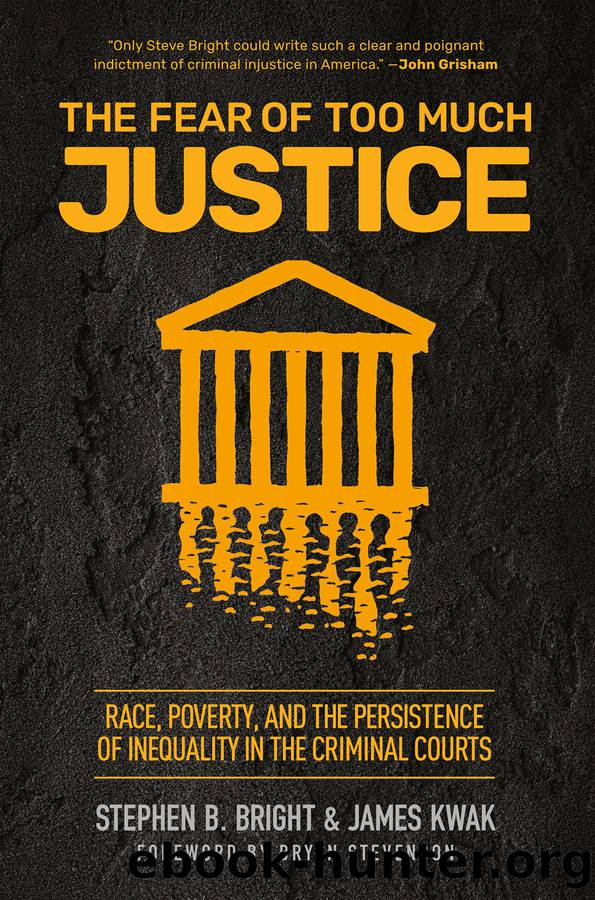The Fear of Too Much Justice by Stephen Bright

Author:Stephen Bright
Language: eng
Format: epub
Publisher: The New Press
The Inequality of Money Bail
Maurice Walker, a mentally ill man whose only income was $530 per month in Social Security disability payments, was arrested in September 2015 in Calhoun, Georgia, for being a âpedestrian under the influenceââwalking while intoxicated. He was jailed because he could not come up with $160 in cash to make bail, even though the charge was not punishable with jail time. He could not seek a reduction of bail until his first court hearing eleven days later. While in jail, Walker could not take the medication he needed for his mental illness.72
For many minor violations, a person is issued a citation and told to report to court on a particular date. However, people arrested and taken into custody even for minor offenses may be held in jail unless they can âpost bailââput up a certain amount of money or property that will be returned only if they appear at all their court dates as scheduled. The purpose of bail is to ensure that a person who is released returns to court.
In 1983, the Supreme Court held that depriving an individual of âconditional freedom simply because, through no fault of his own, he cannot payâ violates the Fourteenth Amendment.73 As New Yorkâs highest court explained, âThe policy of our law favors bail because of the presumption that the prisoner is innocent.⦠The amount must be no more than is necessary to guarantee his presence at the trial.â74 And yet, on any given day, almost half a million people in jailâmore than 70 percent of the jail populationâhave not been convicted of anything but cannot afford to post bail.75 At the Rikers Island jail in New York, the median bail for detainees awaiting trial in 2017 was $5,000; according to one defense attorney, judges routinely used unaffordable bail to âlock people up before trial if they had a hunch that they might re-offend.â In Pennsylvania in 2016 and 2017, the average bail was more than $38,000 (although some counties allowed defendants to post 10 percent of the bail amount), and more than half of defendants were unable to post bail.76
People without the cash to make bail have one other option: the bail bond industry. A bail bond company or bail bondsman âposts bondâ for the defendant; without putting up any cash, the bondsman agrees to pay the defendantâs full bail amount to the court if the defendant does not appear when required. The bondsman carries insurance that covers the cost if the defendant does not appear. Defendants pay bail bondsmen a nonrefundable feeâusually 10 percent of the bail amountâfor this guarantee. If a defendant cannot pay the fee up front, a bondsman may allow him to pay in installments, but failing to make a payment exposes a person to late fees and high interest rates. Bail bond companies also impose additional fees, such as a fee for electronic monitoring. For instance, one person in California who had a chronic medical condition was charged $300 for each hospital visit because he had to have his ankle monitor removed and reattached each time.
Download
This site does not store any files on its server. We only index and link to content provided by other sites. Please contact the content providers to delete copyright contents if any and email us, we'll remove relevant links or contents immediately.
The Borden Murders by Sarah Miller(3597)
The Secret Barrister by The Secret Barrister(3017)
Coroner's Journal by Louis Cataldie(2110)
Police Exams Prep 2018-2019 by Kaplan Test Prep(2041)
The Splendid and the Vile by Erik Larson(1794)
Terrorist Cop by Mordecai Dzikansky & ROBERT SLATER(1724)
A Colony in a Nation by Chris Hayes(1514)
My Dark Places by James Ellroy(1511)
Black Klansman by Ron Stallworth(1449)
A Life of Crime by Harry Ognall(1384)
Objection! by Nancy Grace(1338)
Whoever Fights Monsters by Robert K. Ressler(1326)
The New Jim Crow by Michelle Alexander(1322)
American Prison by Shane Bauer(1292)
Obsession (The Volkov Mafia Series Book 1) by S.E Foster(1284)
Anatomy of Injustice by Raymond Bonner(1273)
The Art of Flight by unknow(1268)
A Higher Loyalty by Comey James(1245)
A is for Arsenic: The Poisons of Agatha Christie (Bloomsbury Sigma) by Kathryn Harkup(1217)
